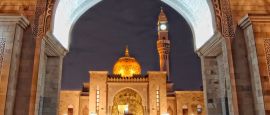This sweeping arc of old, balconied buildings and tiled mosque domes, souvenir shops and carpet vendors begins with the early-morning fish market, is punctuated with 18th-century Mutrah Fort and ends with musical fountains overlooking the harbour. It's a popular evening stroll for Muscat's citizens keen on catching the sea breeze.
Things to see in Muscat
Tourist offices
Address: Thaqafah Street, Ministries District, Muscat, Oman
Tel: +968 800 77799.
Opening Hours:Sun-Thu 0730-1430. www.omantourism.gov.om
There are not any dedicated tourist information centres as such in Muscat but you can pick up some brochures from the helpful desk at the Ministry of Tourism or find information on its website. Alternatively, National Travel & Tourism (tel: +968 2466 0300; www.nttoman.com), along Al Wutayyah Street, acts as an unofficial tourist desk.
This wonderful old souk runs through a warren of alleyways off Mutrah Corniche, with cupboard-sized shops selling everything from home-grown frankincense, gold and myrrh to plastic trays and Omani khanja (ceremonial daggers). Stop to look for strings of semi-precious ‘gems’ in bead shops festooned with handicrafts from Afghanistan to India.
Mixing Islamic and Italianate architecture, the Royal Opera House is a wonderful 1,100-seat concert hall that also hosts theatrical performances. Its season runs from September to May and all concertgoers must adhere to a smart dress code. No jeans or trainers are allowed, but overalls are available to hire at the venue.
A masterful piece of modern Islamic architecture, the comparatively unassuming Indian sandstone exterior of the Grand Mosque belies an almost overwhelmingly beautiful interior that’s rich with hand-loomed Persian carpet, elaborate tile work and a huge chandelier. It’s also the only mosque in Oman open to non-Muslims. Dress modestly during your visit.
Although you can’t enter this flight of architectural fancy, a stroll around the perimeter fence from the grand esplanade at the building's entrance to its seafront back garden on Mutrah harbour is a must. The graffiti scratched into the harbour’s rocks is a virtual logbook of naval vessels that have docked in this port.
Part of the capital's cultural offering, this imaginative and informative museum charts the city's development from the prehistoric era to modern times. Located by the fish roundabout at one end of the corniche, it also doubles as an exhibition space and is housed in an attractively restored old Muscat villa.
Muscat has several small museums dedicated to Omani heritage, but this collection of antique weaponry, jewellery and furniture is its best. With early maps, photos and prints as well as coins and stamps, it gives a flavour of life before the 1970 coup. It also includes a restored house, Bait Al Dalaleel.
Muscat's uninterrupted beach of pale sand is bejewelled with shells and ornamented with sea birds. It stretches for 20km (12 miles) and is great for gaining a feel for the soul of Muscat as lady joggers in their abayas (black clothing) exercise in the morning, football teams gather at sunset and families picnic into the early hours.
Once the grand entrance to Muscat itself, this charming turreted gate was still locked shut each night until 1970 – despite an opening being made for passing traffic. Today it houses a small museum, which traces the history of Oman through municipal highlights like the Falaj irrigation system and local architecture. It’s the corniche views you’re really visiting for.
More than just an art museum, the Omani Society for Fine Arts is the driving force behind the emerging slew of painters, sculptors and photographers in Oman. Expect intermittent exhibitions of the best contemporary art from the country that runs the gamut from ceramics and caricatures to calligraphy and graphics.
Do you have any Feedback about this page?
© 2026 Columbus Travel Media Ltd. All rights reserved. No part of this site may be reproduced without our written permission, click here for information on Columbus Content Solutions.








 You know where
You know where